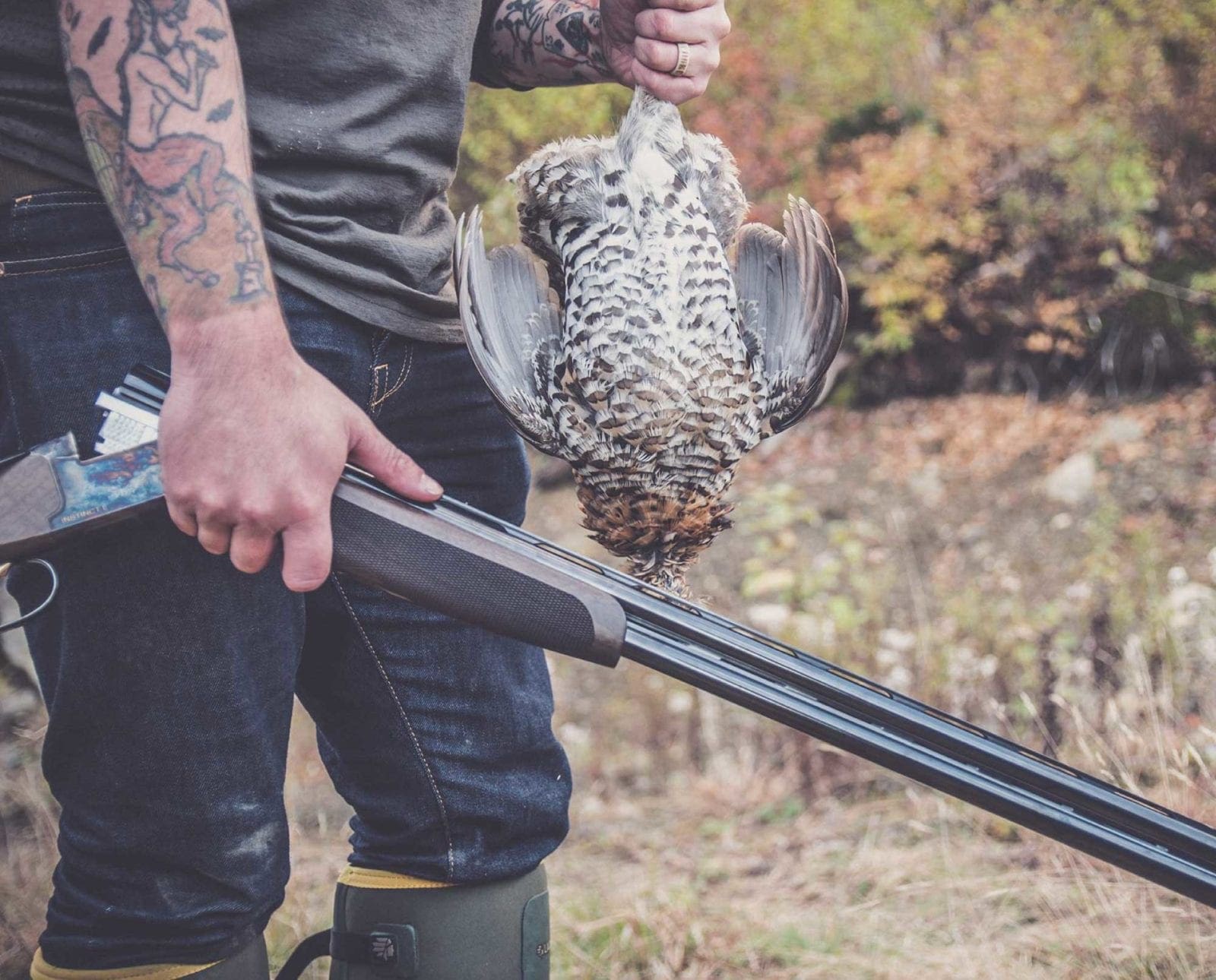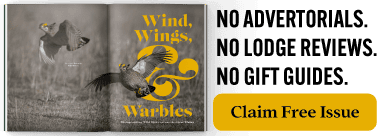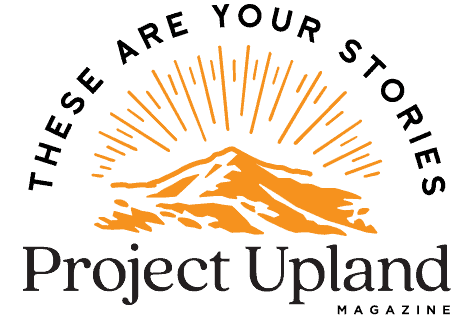Home » Hunting Culture » Bird Hunting Without a Dog – Breaking the Stigma
Bird Hunting Without a Dog – Breaking the Stigma

A.J. DeRosa, founder of Project Upland, is a New England…
Bird hunting without a dog is a controversial subject in the upland community, but nevertheless it is an important part of our culture.
I shot my first American woodcock and my first ruffed grouse over an Brittany back in the late 80’s. The dog listened, but was not the most conventionally trained bird dog. He acted more like a flusher than a pointer and would eat the first bird of every season (without fail). I learned to hunt birds over that Brittany, but would spend the largest part of my upland adventures bird hunting without a dog. It was an amazing time in my life and I respect it as a difficult and challenging path that leads many to owning a bird dog. Some, not.
Differences are okay, calm down.
Bird hunting without a dog is different. In fact, I will quickly agree that it is altogether a separate pursuit. It’s like comparing deer hunting with a bow to hunting lions with a rifle. The methods, the measure of success, and the outcomes are all different. For that fact, we should respect it as the separate hunting pursuit it is. Some of us will only hunt with a dog, some of us just want to watch a dog work. Some of us want to just walk alone with no dog, some of us have never wanted a dog. Heck, maybe some of us are even allergic to dogs. These reasons are personal choices and should not be the subject of vicious snobbery or public judgment.
It’s no different than the debate over steady or not steady. I do not tell you how to live your life, you do not tell me how to operate my dog. Constructive conversation over expanding varying training methods, reasoning for training, and any other healthy discussion is important to the advancement of our pursuit. After all there, is more than one way to skin a cat.
For Conservation’s Sake, leave the Dogless Hunters Alone
According to Minnesota, 56.3% of people are bird hunting without a dog. The math starts to make a lot of sense fast when we think about losing more than half of the revenue for the pursuit of upland birds. When we start singling out people bird hunting without a dog, we begin to also turn them away from conservation efforts that are questionably more critical than big game issues. For the fight of future hunting, we need everyone’s help as a community and not as enemies. At the end of the day, the fight for the future of upland hunting trumps all our opinions.
Other Reasons than Wanting a Bird Dog are Maybe at Play
I want plenty of things in life—we all do. But that does not always make them obtainable. Inviting a bird dog into our lives is not a small decision. It involves a 365 day a year commitment. It requires money, time, and space. Some people cannot afford it, some people live in small apartments. The fact is that sometimes dogs just do not fit into our lives at some given moment. Just because someone is bird hunting without a dog does not always translate to an option. All the more reason to take someone else hunting if you do have dogs and leave a dogless hunter free from judgment.
The Ethics Debate.
Most publications wouldn’t touch this subject with a 300 foot pole, but we are going to take it head on. I will start by suggesting anyone hunting without a dog to read How to Recover More Birds Without a Dog. The single most common debate of why birds should be hunted with a dog is because of bird recovery. The facts are simple and straight forward: yes, dogs will recover more crippled birds. However, in my opinion, the issue of ethics comes into any commitment to recover a wounded animal, dog or no dog.
How many deer hunters will lose deer? How many of them put in the most effort possible to recover that deer? This question is the one that determines ethics. In my days of bird hunting without a dog, there was almost no limit to the commitment of time and energy to finding a bird. That is the ethical choice: give it our everything because the bird owns that respect. Having a dog does not make it more ethical than the next hunter without one. We have all seen hunters with dogs put little effort into recovering a bird. This is the kind of thing that should get under the skin of any real hunter, regardless of your pursuit.
We are hunters. If there is one thing that we all understand as part of the natural order, it’s that nothing goes to waste. It’s harsh, but real. Our bird populations will not be saved one cripple at a time, it will be saved one conservationist at a time, dog or no dog.
Still Have a Problem with Bird Hunting Without Dogs?
That is okay, but I want to challenge you. Instead of being critical to those that do not hunt with a dog, convert them. Offer your own dogs. That will be an experience they will cherish and remember. Then, maybe one day they will join the other bird hunting pursuit (with dogs).
If you asked me the question, “Would you go bird hunting without a dog,” five years ago, I would have said “Let’s go.” Ask me the same question today and yes, I would be a little bit more hesitant to start putting boot rubber over the Appalachian Mountains. Nevertheless, we have still taken the time to document dogless bird hunting with films such as Partridge Country, The Experience, and Searching. Despite the difficulty of the challenge, it is an important part of culture to celebrate and welcome into our community.
Although the greater part of my upland adventures was bird hunting without a dog, I am eager to not only continue the training of my first bird dog but also to give the opportunity to my hunting friends to experience shooting their first pointed birds this fall and covert them. The same way I was converted.
A.J. DeRosa, founder of Project Upland, is a New England native with over 35 years of hunting experience across three continents. His passion for upland birds and side-by-side shotguns has taken him around the world, uncovering the stories of people and places connected to the uplands. First published in 2004, he wrote The Urban Deer Complex in 2014 and soon discovered a love for filmmaking, which led to the award-winning Project Upland film series. A.J.'s dedication to wildlife drives his advocacy for conservation policy and habitat funding at both federal and state levels. He serves as Vice Chair of the New Hampshire Fish & Game Commission, giving back to his community. You can often find A.J. and his Wirehaired Pointing Griffon, Grim, hunting in the mountains of New England—or wherever the birds lead them.




Nice article. As someone just starting out without a dog, I can see that it might be a handicap in terms of finding and retrieving birds. But it can also be a teaching opportunity to truly immerse oneself in the environment and learn how to find birds without the assistance of a dog. As you mention, the dog is a big commitment particularly when all the grown-ups are at work all day!
I hope this will brighten your perspective. In the weeks and months that I’ve been following your site and reaching out to people through web message boards trying to find the right way to start upland hunting, I haven’t yet encountered any dog snobbery. On the contrary, most people have said “no problem, there will be other people there with dogs.” And one person, just yesterday, mentioned to me that “just because someone has a dog doesn’t mean they know what they are doing!”
I started hunting partridge, pheasant and ducks without a dog. Then at the age of about 13 I got a great black lab. First I trained her to fetch during the first winter in the basement. We took her hunting pidgions under bridges. She retrieved them. Then ducks. She loved to retrieve from water and was awesome. Then pheasant. We always saw more birds with her. They wouldn’t run ahead and she always found the wounded ones. I’d guess my percentage went from 60 to 99 of birds found with Lady. Hunting partridges and sharp tail was easy with or without her. There were cactus in the sharp tail place so I didn’t take her with. Then she passed away. I don’t want another dog. I like hunting alone or with some people with or without dogs, preferably without. I try to not let any wounded birds get away. You have to be very selective……or good. ????
Interesting. I’ve been a grouse hunter for 47 years, without a dog, have met many bird hunters over the years, some with dogs, most without. I have never directly or indirectly heard of dog-less grouse hunting being anything more than just a more challenging way to hunt. No controversy. In fact, some hunters with dogs are somewhat impressed that we hunt without a dog. I think for many who have never done it without dogs, the thought of it is hard to comprehend in terms of difficulty.
Growing up we could never afford a bird dog. I’ve hunted pheasants with other’s dogs and own beagles for rabbits, and I really understand the draw. Still, I can’t justify the cost of pro training. But harvesting birds has never been a problem(the real problem is hitting the birds). Finding downed birds can be challenging, but with careful observation, replaying the shot, and systematic follow up bird loss can be very limited. It takes dedication to the respect and honor of the bird, doing all you can to find it. It’s just what you do. I guess we’ve been doing it for so long with so little(maybe 5 birds in 47 years) bird loss that it’s just second nature. And a dog doesn’t guarantee success before and after the shot either, even a good dog.
Owning a good bird dog in one of the classic breeds and being able to use it regularly is a dream of mine and I suspect many grouse hunters. Of course the weather would be perfect, the fall colors grand, the birds plentiful, and the memories longlasting…
I started hunting 2 years ago. I shot my first woodcock and first grouse without a dog. Life stage is the main reason I’m dogless. I live in a high-rise condo in Chicago – about the farthest you can get from the Grouse Woods. My wife got the dog she’s always wanted when we first moved there 4 years ago. A maltipoo, who’s whip smart, and is a squirrel and rabbit hunter in her own right. No joke she actually caught a rabbit in the park once. And now, our firstborn son is 7 months old. Fitting a hunting dog into our situation is out of the question.
While I see hunting breeds in the city, Brittany’s and Labs, they’re typically owned by someone who has the flexibility to be home and take multiple walks/runs through the day. Or are otherwise noticeably unhappy, like the Irish Setter that’s confined to a townhouse “yard” and always seems high strung and agitated. For me keeping a young and energetic hunting dog locked up in 1,100 square feet for 8+ hours a day is not only unfair to the dog, but seems like a recipe for furniture disaster.
I long for the partnership of a dog in the field. But I also think I may turn out to be a better hunter having been forced to wait a few years for that partner. Instead relying on my own instinct or the partnership of my dad and brother. I have to think harder about habitat. I have to be the bird dog – getting “in there” to get at where the birds may be. It’s hard work, but more knowledge of the bird and the covert is achieved than sticking to the easier walking. Many bird writers discuss the same of hunting alone.
I’d challenge everyone to try it at least once. If nothing else, it will make you better appreciate your dog. And, you’ll probably learn a thing or two while you’re “in there”.
It’s cool if you do, it’s cool if you don’t. It’s all good.
Great article and discussion. I don’t have a hunting dog but I’m blessed to have hunting friends that do have dogs and invite me along. I also enjoy bird hunting without a dog so have experience both activities.
What I learned and the best tip I can give a dogless hunter is to walk directly and quickly to any bird you shoot. Don’t try for doubles you only lose one or both.
I’ve been a dogless hunter for 30 years and honestly have never understood the need for a dog and much prefer hunting alone without one. I find hunting with a dog annoying and distracting, I think most people who hunt with dogs enjoy watching the dogs more than the actual hunt. When I’m in the woods I want to be both the hunter and the shooter, I have no problem finding birds before they flush because over the years I have learned to spot them effectively. To me a dog busts more shooting opportunities for grouse than they actually help with, but I can see their value for hunting pheasant and woodcock. I have never experienced the stigma this article talks about, dog hunters are very much the minority where I hunt and to each is own.
Well put I’ve hunted ruffed grouse without a dog for 26 yrs and have never knowingly hit a bird and could not retrieve it I think hunting without a dog makes me a better hunter and I have more respect for the bird I’ve learned to only take shots where I can see it go down even if it means flushing a bird 3 times and forcing him to go where I can get a shot I just purchased my first bird dog may of 2021 Duetsch Drahthaar and am looking forward to learning how to hunt with him
“and would eat the first bird of every season”
LOL We obviously had the same dog!
This is absolutely ridiculous. I’ve shot 3 pheasants so far. And I just really started. I don’t have a dog. I missed one a couple days a go. I told another hunter who had a dog where it went. And he had an arrogant way he acted. I have zero issues hunting ruffed grouse and cottontails without a dog. I’ve chased the same grouse for hours. Missing then flushing again. What I do is find where I think they are. Then I stop often. It makes them nervous. If they are there they will run or flush. Walking too fast you won’t see much. Now I just really started pheasant hunting. I live in upstate NY. The pheasants are stocked. At first they are dumb. They hesitate and I’ll shoot them off the ground. Sometimes they act just like a grouse. I stop often and they sometimes flush. If I see them out of range. I run at them. If I can see where they went quick enough. I’ve been able to kick them up. They are much harder to find again after they run or fly somewhere. They are very sneaky once spooked. I shoot for the head and I’ve been passing on some shots. Because I need them to go down close. The crap they go into makes it hard to locate them. I learned that the hard way. I shoot way less than I do with grouse. Closing the distance on an out of range pheasant by running at them is key. I can do this because they like hanging out on this wide trail between a hedge row and big golden rod weed field. Another place when the get pressured they’ll be right in the thickets. Sometimes you almost have to step on them. Sometimes they cooperate with the stop and go method. When they are in cover. I look for cover with place they can hide yet still escape. I like hunting without a dog. Because you really learn the habits of the animal. It’s like 2 different sports. I think a dog would make it more productive. My goal is to experiment with chokes and loads that give me the most killing power. Because hunting pheasant solo. It doesn’t seem like you get many 2nd chances at them. I’ve literally ran at one. Saw him go into a brush field. And I knew he was close. I had to get really close to him to get him to flush. I also seen exactly where they’ve landed. Say 50-75 yards away. And nothing. I think they either won’t move. Or they land and run. If that was a ruffed grouse is almost always find him.